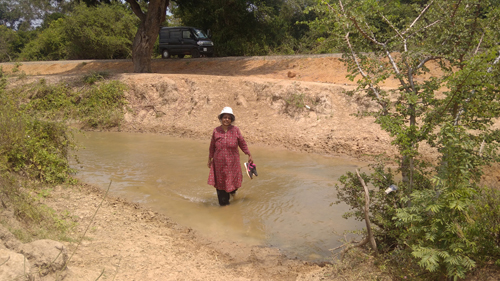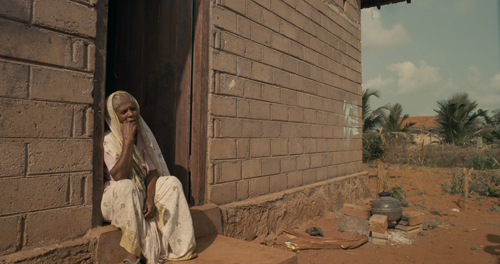A humane look at the villagers of Palaikuli

In new terrain: Sumathy Sivamohan
‘Amid the Villus’, Sumathy Sivamohan’s latest documentary – also her first (having so far done only feature films) takes you to Palaikuli, the dry scrubland village in Musali South where for ages a pastoral people have tended to cattle and goats.
It is a poetic, humane, behind-the-headlines look at the ‘Musali land-grab’ where she documents the story of the community that was vilified in the news for infringing on the vintage ‘land of the leopard’ at Wilpattu.
The film depicts how for them the land was simply home; how in 1990, as a war casualty, these farmers had to bundle a few belongings and trek towards Puttalam, and it was only in that cusp of hope in 2010 that they could come back.
In 2017, a Government gazette declared four localities near Wilpattu, as forest areas and villages in Musali South, including all-Muslim Palaikuli, lost land they used for grazing and paddy cultivating, land already scarce seeing as more people returned than went away.
Even if, by 2010, the original homesteads were gone, a familiar sentinel tree, the villus, the white rock where egrets and storks used to roost, these spelt ‘home’ to them. But, as they relate in the film, they returned after 20 years only to have parts of land taken away by officialdom.
Without land and grazing ground for livestock the people were greatly crippled. To make things worse they were accused of encroaching into forest land.
Sumathy, Professor of English at the University of Peradeniya, winner of the Gratiaen Prize 2001, poet, performer, filmmaker with several film awards, has always had a deep interest in displaced people.
Sister to the slain activist Dr. Rajini Thiranagama and other siblings Nirmala and Vasuki, Sumathy’s filmography includes Ingirunthu, Oranges and Piryalam.
Her book Like Myth and Mother: A Political Autobiography in Poetry and Prose was published in 2008. Her Gratiaen winning book was In the Shadow of the Gun & Wicked Witch.
When Sumathy arrived to do her film, she says she found “people actually living with the environment” rather than destroying it.
Their community is often seen as a faceless, nameless demographic, but the camera, says Sumathy, highlights the humanness of people: expressions, gestures, movements all rendered symbolical and in this case vulnerable.
Sumathy wanted to portray the struggle for survival the people were going through. Some possess deeds for the land while others “claim it in other ways, through ancestry, through work… that they have a connection to the land that goes beyond the state’s”.
Shot sporadically through Covid, on a shoestring budget, the documentary film proved to be a challenging genre. It is only after the last scene has been shot and the last voice faded that you really begin to see the story clearly, says Sumathy.
All that while you are shooting, “you are exploring and pushing the boundaries.” Then everything is put together in the editing stage. “There is a lot of material, and a lot of work.”
The folk of Palaikuli were quick to banish any hesitation that Sumathy had about approaching the incendiary topic.
“I didn’t want to put anyone in trouble, or force them to tell a story that they didn’t want to.” But everyone proved surprisingly open and welcoming.
Stopping for a ‘plain tea’ at a kade one evening, Sumathy was drawn into a casual chat which unearthed so much discussion, she asked her cameraman to film what was a totally unplanned discourse on rough-hewn log benches under a tree. It now features in the latter half of the film.

Villager Rayathumma at her doorstep
The team that toiled through the Vanni with Sumathy included DOP Sunil Perera while the editing was done by Elmo Halliday. The consultants were the late H.S. Hasbullah and M.M. Mohamed Masthan.
The 47-minute film has been screened four times, most recently at the International Centre for Ethnic Studies (ICES). Sumathy meanwhile is considering having subtitles in Sinhala as well so that this story could be seen in the south…
Searching for an ideal partner? Find your soul mate on Hitad.lk, Sri Lanka's favourite marriage proposals page. With Hitad.lk matrimonial advertisements you have access to thousands of ads from potential suitors who are looking for someone just like you.


